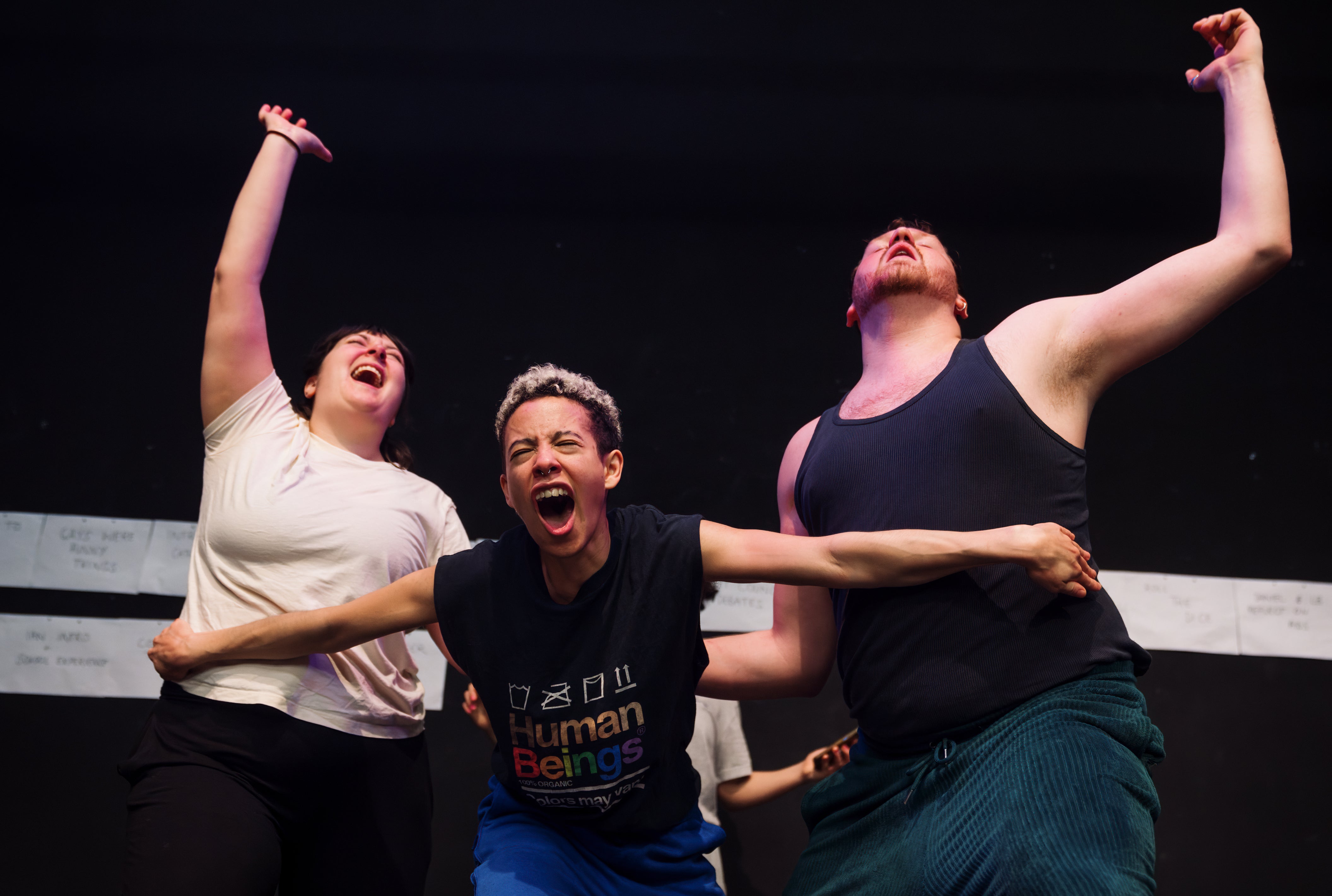‘It feels like a healing process’: Breach Theatre on making a musical about Section 28
Two decades on from the repeal of the law that banned the ‘intentional promotion’ of homosexuality in schools, risk-taking theatre company Breach are making a musical about Section 28. They tell Isobel Lewis about the present day parallels


When Breach Theatre’s Billy Barrett and Ellice Stevens started telling people that they were writing a musical about Section 28, the 1988 piece of legislation that banned local authorities from “intentionally promoting homosexuality”, they were surprised by how little their peers knew about the subject. But when the pair, who are in their early thirties, began trawling the archives and conducting their own research, the writers realised they didn’t really know anything about it either. “Everything was kind of new to me,” says Stevens, as I sit with the pair at the New Diorama Theatre, where the show is being staged. Oh, except for one thing. “Apart from the experience of shame,” she laughs. “Apart from the trauma,” adds Barrett, joining in. Stevens stops and thinks for a moment. “Yeah, that’s kind of rang true for me.”
While LGBT+ lives in the 1980s and 1990s have been the subject of a number of recent stage and screen projects, Section 28 itself is rarely the main focus. It’s mentioned in Russell T Davies’s groundbreaking Aids drama It’s a Sin and is the backdrop to the recently released lesbian drama Blue Jean, but, as Stevens and Barrett point out, it’s difficult to dramatise. As Stevens asks, “how do you make a play about a piece of legislation?” Section 28 was in place for 12 years in Scotland and 15 in England and Wales, during which schools, libraries and other public services weren’t allowed to acknowledge LGBT+ people. How do you explain – let alone dramatise – silence?
Stevens and Barrett have navigated these challenges with panache; After the Act is a vast stretching musical extravaganza set to a punchy Eighties synth beat. The title nods to the eve of Section 28’s introduction, when Ian McKellen staged a theatrical performance protest evening called Before The Act at the West End’s Piccadilly Theatre. Breach Theatre’s show aims to capture that same “variety show” spirit, combining first-person testimony with the stories that made the headlines at the time, such as protests by groups of lesbians who abseiled into the House of Lords and crashed a BBC News broadcast. With After the Act, they want to create something loud, energetic and fiercely political – just like McKellen’s event.
Section 28 might be a challenging topic to stage, but that’s never stopped Breach Theatre before. In 2019, Stevens and Barrett wowed the Edinburgh Fringe with historical drama It’s True, It’s True, It’s True, about the real-life trial of Agostino Tassi for the rape of baroque painter Artemisia Gentileschi in 1612. For Barrett and Stevens, who are directing and starring in After the Act respectively, this will be the first major project since then – and since the pandemic. It’s also their first full-scale musical, one all about “queerness and shame, and shedding that shame, and really celebrating the queer experience”, Stevens says. Other real-life stories they’ve brought to the stage have included a scientist who teaches a dolphin to talk and the 1985 Battle of the Beanfield at Stonehenge.
The word “queer” – a term now reclaimed by many LGBT+ people – carries extra weight when discussing Section 28. The law was in place until 2000 in Scotland and 2003 in England and Wales, meaning it impacted Barrett and Stevens’ school years. “I’d already felt such shame, and I’d been bullied, and teachers weren’t able to intervene, or I’d had conversations with teachers who couldn’t say certain things,” Stevens says. Barrett nods: “You couldn’t have conversations about [homophobia] when you probably needed it most, when you were a teenager… I think Section 28 really took away the opportunity for those conversations to take place and those role models to be there.”
To bridge the gaps in their own knowledge when creating the show, the pair scoured newspaper clippings and parliamentary archives, reading “really, really homophobic things”. At the same time, they conducted between 30 and 40 in-depth interviews with people affected by Section 28, allowing them to “facilitate conversations that actually weren’t allowed to happen”. They spoke to students who were at school at the time and couldn’t ask for support, teachers who couldn’t offer support to students because of the law, and activists who were trying to do something about it.
But telling the story of Section 28 carries a particular weight in 2023 – one that goes beyond the anniversary of its repealing. When It’s True was staged in 2018, audiences and critics alike pointed out its powerful relevance to that current moment, one year on from the #MeToo movement. Section 28 may have been introduced 35 years ago, but the theatre-making pair see the homophobic rhetoric that surrounded the legislation in 1988 as reflective of modern-day transphobia.

The parallels were cemented for Stevens and Barrett during their lengthy research process, when they read shocking diatribes and headlines from the right-wing press and politicians of the time about “protecting children” – something they saw echoed in news and online “discourse” today. “A lot of the public debates that happened around gay rights are being almost resurrected around trans rights now,” Barrett says. “It’s quite chilling, when you read it, when you trawl through the archives in the way that we have… how many phrases and words and images are repeated now.”
As the founders of this proudly queer theatre company, Barrett and Stevens have no intention of “trying to hide away from the side that we’re taking” with After the Act. Still, they’ve tried to understand where that counter-position came from. After all, there are people who lived under or protested against Section 28 who now use that same rhetoric about trans people. “It’s easy to caricature them or be like, ‘They were bigots’, and probably some of them were, but also it was coming from a place of a fear of the unknown that something’s being imposed on them,” Barrett says. “To be really generously sympathetic, you might say that that is a similar thing now. People are just scared of something new. I don’t think that’s an excuse, but that’s why, isn’t it?” Stevens adds: “It’s a fear of…” She pauses. “I don’t know. I don’t know what that threat is. But it’s definitely fear.”
Stevens and Barrett hope that After the Act will show the similarities between 1988 and 2023 to those who may not have noticed them. The process has been educational for them, on a historical, social and personal level, and there’s a desire to pass that on. “Being able to have these discussions now, having these conversations feels like a sort of healing process, or really coming to terms with it,” Stevens says of the law’s aftermath. “That idea of actually meeting loads of LGBT people and having those conversations felt really new for me, and it was really healing for me and I think healing for them, in part. It’s been brilliant. Really emotional, really brilliant.”
‘After the Act’ runs at New Diorama Theatre until 1 April



Bookmark popover
Removed from bookmarks